Silver nanoparticles obtained by eco-friendly method using Galanthus nivalis plant for wood conservation
I. R. SUICA-BUNGHEZ1,
I. C. COVALIU2,*
,
A. A. SORESCU1,3,*
,
L. C. NISTOR4,
M. CONSTANTIN1,5,
I. RAUT1,
R. M. ION1,3
Affiliation
- National R&D Institute for Chemistry and Petrochemistry, ICECHIM, Bucharest, Romania
- Department of Biotechnical Systems, Faculty of Engineering Biotechnical Systems, Polytechnic University of Bucharest, Romania
- Valahia University of Targoviste, Materials Engineering Department, Targoviste, Romania
- 1National R&D Institute for Chemistry and Petrochemistry, ICECHIM, Bucharest, Romania
- University Titu Maiorescu of Bucharest, Faculty of Pharmacy, Bucharest, Romania
Abstract
The phytosynthesis of metallic nanoparticles (MNPs) represents an interesting domain of research, with promising
perspectives especially in medicine and food protection. A special area represents biosynthesis of MNPs by vegetal
materials. In the present research, synthesis of silver nanoparticles (AgNPs) was obtained through a simple method, using
different parts (flowers and stems) of snowdrop plant (Galanthus nivalis L.). The AgNPs were formed by reaction of biomass
of Galanthus nivalis extract with aqueous solution of AgNO3 at room temperature and dark conditions. The synthesized
nanoparticles were confirmed by UV–VIS spectroscopy (between 250-750 nm), optical microscopy and dynamic light
scattering – DLS (indicated that all the particles are nano-sized with average diameters between 200-400 nm). To
demonstrate the presence of bioactive components of snowdrop plant (flowers and stems), the extract was quantitatively
(polyphenols, flavonoids) and qualitatively (alkaloids, carbohydrates, terpenoids) characterized. The antioxidant activity
(AA%) of snowdrop extracts and AgNPs samples was evaluated using DPPH method. AA% showed an increase at AgNPs
samples compared to the extract. The antimicrobial activity of AgNPs samples was demonstrated by testing on Candida
albicans and Staphylococcus aureus and it was resulted a good activity against these two pathogens. Next step of this
research was to find an application of snowdrop-derived AgNPs for the wood treatment or preservation of wood objects.
Keywords
Plant extract, Green methods, Silver nanoparticles, Bioactivity (antioxidant and antibacterial) properties.
Citation
I. R. SUICA-BUNGHEZ, I. C. COVALIU, A. A. SORESCU, L. C. NISTOR, M. CONSTANTIN, I. RAUT, R. M. ION, Silver nanoparticles obtained by eco-friendly method using Galanthus nivalis plant for wood conservation, Optoelectronics and Advanced Materials - Rapid Communications, 16, 1-2, January-February 2022, pp.79-89 (2022).
Submitted at: April 12, 2021
Accepted at: Feb. 10, 2022
